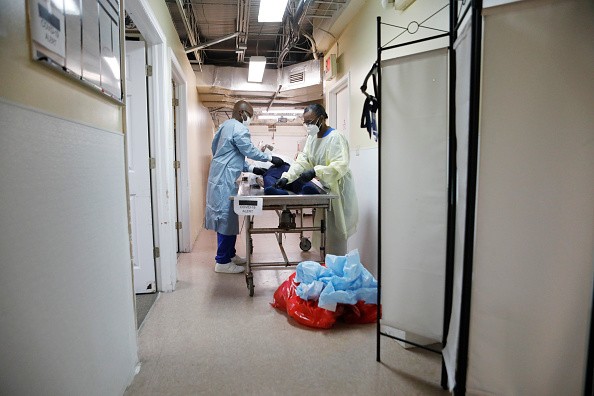COVID-19 Tremendously Affects Latino Communities; Funeral Homes Also Struggle
COVID-19 has destroyed the Latino communities in California. Many Latin Americans are front-line workers who contracted the coronavirus and spread the disease to their families and neighbors.
The grim cycle of the coronavirus disease and death took them to places like Continental Funeral home. Since March, morgues that serve Latino communities were overwhelmed by the families that need their help. In some cases, the bodies are stacking up as operators of mortuaries try to improvise funerals that might have drawn extended family and mourners from far and wide preciously.

Funeral Home Director In Tampa, Florida Prepares For A Funeral For Man Who Died From Covid-19 TAMPA, FL - AUGUST 12: Mortician assistants Marlon Warren (L) and Ruby Johnson clothed a man who died of COVID-19 while preparing for his funeral at Ray Williams Funeral Home on August 12, 2020 in Tampa, Florida. Jeffrey Rhodes, the co-owner of Ray Williams Funeral Home, has seen an uptick in funeral services provided due to the COVID-19 pandemic. "Business has increased to a point where we have to stagger our funeral days and time because of COVID-19", said Rhodes. "Funeral homes are the forgotten front-liners when caring loved ones during the pandemic. This has become our new normal."
Magda Maldonado, director of Continental Funeral Home, said, "It's been so difficult for the families. They have been unable to express their condolences properly or participate in service."
According to the state Department of Public Health, Latinos make up 39% of California's population. Still, with COVID-19 cases, the Latinos have 59% of it in the state, while 47% of deaths are from Latino communities. Amid the pandemic, immigrants have been particularly hard-hit economically, knowing that many of them are losing their jobs and are facing financial collapse.
Maldonado witnesses these hardships at her funeral home. According to the Los Angeles Times, most of the clients are immigrants from Central America and Mexico. Maldonado's business is 60% devoted to transporting bodies to their homelands due to its less expensive costs to bury their loved ones to their funeral homes.
"We were dealing with 35 to 40 bodies at one point in March," Maldonado said. Flood of bodies was sent to their funeral home when the COVID-19 outbreak hit.
The funeral home director rented a small refrigerated storage container for $1,900 per month to manage the overflow of bodies being sent to them daily. The funeral home has increased its capacity to about 55 bodies.
Separating the bodies of people who died from COVID-19 complications from those who died due to other causes helped, as per LA Times. Maldonado reiterated capacity problems had to do more with the shutdowns.
The required documents from state and county offices that took a few days were taking weeks instead. The process of sending back the bodies to Mexico stretched from ten days to two months. Simultaneously, cremations that only took a day could now have to be made by appointment.
As per Maldonado, the situation caught off guard, and the local government don't know how to manage this kind of emergency. She said she didn't think anyone thought about all of these other funeral issues that they had.
Maldonado's operating costs increased due to the pandemic and even hurt more to the families that their funeral home has been trying to serve. Transporting a body to Michoacan, Mexico, for instance, could cost $4,200, which could be shaved off about $1,500 in the past if the family couldn't pay the full amount. But now, Maldonado has reserved those discounts only for the neediest families or consulates that assist people.
The biggest problem that the funeral homes are facing is fundamental. It is how to allow families to mourn for their loved ones while ensuring those who attend the funerals wouldn't get sick.
In the previous Latin Post report, Latinos are said to have a higher risk of contracting COVID-19 due to cultural practices.
Check these out:
Latino Families Now Struggle with Remote Learning
Segregated Parks Contribute to COVID-19 Spread of Black and Latino Communities
COVID-19 Cases in US Nursing Homes Increase by Nearly 80% Earlier This Summer
Subscribe to Latin Post!
Sign up for our free newsletter for the Latest coverage!
© 2026 Latin Post. All rights reserved. Do not reproduce without permission.












